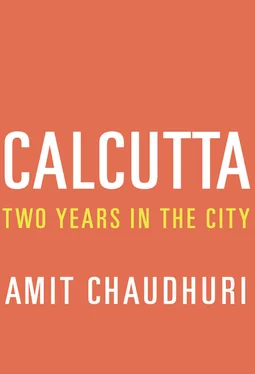Outside the context of whatever family and private life she has, and the property she and her husband own in Subhasgram, Lakkhi’s work is not that much better than slave labour. Of course, the slave owners of ancient Greece had their own sense of morals and propriety and justice when it came to slaves, and we aren’t without morals or propriety when it comes to kaajer lok. And there are reasons why we’ll draw the line, and not permit ourselves to be entirely at the mercy of someone like Lakkhi — though, most often, we believe we are, unlike that slave owner in ancient Greece. Comparing ourselves in Calcutta and India to ancient Greece, or even to modern Saudi Arabia, we feel we are somewhat better, that our employees have a range of privileges — though, in times of frustration, we might envy the Greek slave owner. The second time Lakkhi came to work for us was after two years had passed and the heat of her recalcitrance had cooled, while our memory of her delayed arrivals, her loud retorts that made us flinch, her powerful and robust indifference, had transmuted into something pleasant, and seemed preferable to whatever state of instability then ruled the kitchen. Lakkhi was welcomed back discreetly to her rightful place.
She was now a bit heavier, and had lost some of her mad sparkle, as well as a canine tooth. Her slow uncaringness as she walks in, her bodily awkwardness, her evident unawareness of herself as a sexual being, have all come together — why I don’t know — to give an impression of honesty — in short, that she is who she is. Besides, her face still has a puritanical symmetry and gleam, so that it’s no surprise she never apologises for anything; I can imagine her — roaming in Banaras, her sari loosely tangled around her, as it is in the kitchen; or, back in the eighteenth century, among the early settlers of North America — ploughing forward. Not that there’s a way of spotting a dishonest person; nor are the kaajer lok generally any more or less given to dishonesty than the bhadralok. Still — there’s been a steady outflow from our apartment over the years, denuding us of bhadralok accoutrements: of decorations, saris, cardigans, shoes, precious jewellery. We know who the most likely culprits are — three people in the last twenty years — but have no proof. Sometimes, with a start, my wife will speculate about what Arati did with the Hobbs cardigan, since no one else could have removed it; and whether straight-backed Chandana, with her soulful gaze, ever wears the long, moss-green East cardigan in Sonarpur in the winter. No, it’s most likely they were sold. When a piece of gold jewellery vanishes, my mother mourns, goes into a week-long depression, claims that nothing like this ever happened in her three decades in Bombay, but the police aren’t called, the floors are swept, all the usual chores from daytime to evening are performed. I feel helpless, outraged; I also feel a little like the Sheriff of Nottingham did about Robin Hood’s activities — except, of course, unlike the Sheriff, I’ve had the benefit of reading, and being instructed and entertained and illuminated by, the Robin Hood stories.
The Bengali middle class sees itself rather than kaajer lok as primarily responsible for churi , or theft. Everything valuable must be kept under lock and key; if it isn’t, and if it then disappears, the employer is as much an accomplice as he or she is a victim. Abetment is the primary offence, and it isn’t viewed lightly by the bhadralok. On that count, my family have been serial accomplices and abettors. Lakkhi, however, didn’t take valuables; she purloined supplies from the storeroom and food from the kitchen. When she protested, in her harried way, about the incredible amounts of oil our kind of cooking consumed, and that she was falling short again, we told her excessive oil was bad for the health, to use it moderately, and went out and bought some more. One evening, R returned early, and found Lakkhi and Arati, the maid who helped around the house, standing right in front of the elevator. They’d shut the door to the flat; so R would have to wait for me to get back with the keys. Lakkhi and Arati rushed into the elevator like obstreperous children, and R, pointing to a bulging carrier bag by one of the elevators, said, “What’s that?” They weren’t even aware it existed; indeed, they’d just noticed it: “We don’t know,” they said as the doors closed. R sat on the steps for ten minutes; then thought, “Wonder what’s in that bag?” It was crammed with things from the kitchen and storeroom — two kilograms of Sundrop oil, one kilogram of mustard oil, four kilograms of basmati rice in plastic packets, a one-kilogram packet of moong daal , already-opened packets of chana and matar daal, potatoes, onions, garlic, already-opened bottles of ghee, sugar, about three hundred grams of uncooked mutton from the freezer, beginning to thaw, two neatly folded plastic bags, and some bay leaves. So far, we’ve only felt horror and amusement at the audacity of the operation; now, writing down the list, I feel a self-indulgent wistfulness. How inadequate the provisions seem! Especially since it was the night before Holi — these, the raw materials for the big lunch the next day! But it shocked us. Arati blamed Lakkhi; Lakkhi said it was Arati. “I can’t keep one of you and not the other,” said R. Both had to be dismissed.
After three and a half years, the standards in our kitchen — precarious anyway after Lakkhi’s departure — had declined strikingly. A good cook is near impossible to find. People who take up that line of work are conversant with the stereotypical protagonists of Bengali cuisine — daal, maacher jhol (fish curry), kasha mangsho (dry mutton curry), even the sought-after malai curry, made with prawns and coconut milk — and they know the motions of cooking, of vigorously and convincingly scraping the kadhai with the spatula; but only have a dim sense of what the food tastes like. This may have to do with Bengal’s economic setbacks; yet great artist-cooks were in more plentiful supply when Bengal, in the twentieth century, was as economically devastated as it is today, if not more. Partly it’s a symbol of rural and urban Bengal’s gradual loss of its past, with its delicate artisanal textures. This food too was delicate. Now it is watery. For there’s a thin line separating the delicate from the bloodless, in art as in food. Partly it has to do with the nature of Bengali modernity, which emerged in the nineteenth century as a secular puritanism — evident most clearly in the tenets and practices of Rammohun Roy and Debendranath Tagore’s Brahmo Samaj. This puritanism, which rejected the Hindu gods and goddesses and their antics in favour of an immanent radiance, and which, in the realm of the arts, preferred the implicit to the over-the-top, also kept its distance from strong and violent flavours in food. That modernity is on its last legs, as is its food. What was once implicit is now insipid.
For these and other reasons, feelers needed to be sent out to Lakkhi. Besides, R, who works at a research centre from morning to evening, doesn’t have time to toil over food and research at once. I, who live in Calcutta when I’m not travelling or in Norwich, and who once honed my culinary skills in England, am presently too lazy to take on the responsibilities of the kitchen. My mother is in her late eighties, and can hardly be expected to rustle up meals. Also, what we spend on Lakkhi’s monthly salary and food is roughly what R and I would spend on two or three dinners at decent restaurants. Our approach regarding Lakkhi isn’t unique to Calcutta; it’s the machinery — cheap labour — on which India, even the world, runs today. I say this not to exculpate myself, but to point out that I’m complicit not in a local mode of exploitation, but in a global arrangement. Lakkhi was doing bits-and-pieces work when we sent out the feelers; she was reluctantly happy to, on a marginally higher salary, take up her rightful position again. Calm came back to the kitchen — the false calm around the returned exile, the resumption of a status quo that conceals inner trouble.
Читать дальше












